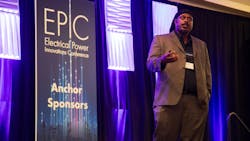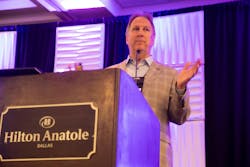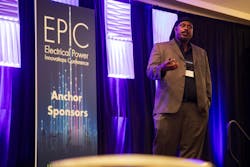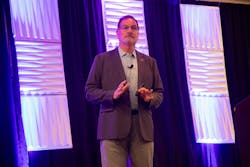EPIC Conference Delivers in Dallas
Held October 13, 2024 in Dallas, NETA’s inaugural Electrical Power Innovations Conference (EPIC) brought industry experts and thought leaders together to share knowledge and discuss the emerging technologies/trends that are poised to shape tomorrow’s electrical power industry. By all accounts, it was an EPIC success!
If you were not in attendance, you missed a different kind of conference. EPIC participants gathered after each knowledge-sharing session to engage the session’s thought leaders and hang in the hallways with voices raised and energized in discussion. These conversations were the catalyst for actions that will be leveraged as EPIC participants return to lead their organizations forward.
The success of EPIC rests squarely on the 68 companies that sent speakers and teams of representatives to participate in the conference’s 12 unique future-focused knowledge-sharing sessions. EPIC participants aimed to keep up with or stay ahead of the technological advancements and trends shaping the electrical power industry.
Though Leadership
EPIC Thought Leadership Sessions focused on four main themes:
- Emerging Technologies
- Renewable Energy, Powering the Grid
- Powering EV and IoT
- Workforce Development
Participants were there to gain insight and understand what is on the horizon of the rapidly evolving electrical power industry and which technologies/developments will impact their businesses, shift their services, and drive training. Three keynote addresses — one for each day of the conference — initiated inquiry. Each future-focused knowledge-sharing session and the discussions that followed covered a different topic. Session thought leaders and attendees deliberated back and forth, traversing subjects that engaged new and old ideas and challenged existing thinking.
What is certain is that the adoption of new technology will be mixed, as it always has been in the power industry. For example, thousands of electromechanical relays (now 40 to 50 years old) are still in service protecting power systems across the United States despite several technological upgrades over the last two decades.
The New Workforce
Looking forward, the span of knowledge required to manage and maintain electrical power systems is expected to explode as automation, digitization, and artificial intelligence (AI) are integrated into existing systems. This places a formidable logistical burden on the system owners, designers, and technicians who lead their companies and customers in caring for the health and life extension of electrical apparatuses. How will our industry ensure that the keepers of power reliability and safety know what they need to know? How do we train older technicians on the new technologies? How do we train new technicians on the old?
The knowledge-sharing sessions on Workforce Development and Management were among the most well-attended. Session thought leaders provided important perspectives on the power industry’s generational melting pot and offered strategies for leveraging each generation’s unique strengths and knowledge to build a more knowledgeable workforce.
Representatives from Texas State Technical College and the U.S. Department of Labor presented apprenticeship models and case studies advocating for academic and corporate collaboration as an important path to building the power workforce. Apprenticeship and co-op programs were offered as a proven approach to leading an educational revolution and driving power-career growth.
Redbrick Insights and Gen Z @ Work provided perspectives on generational integration and leveraging mentoring programs up and down the age continuum.
Emerging Technology
Siemens, Eaton, GE, Doble Engineering, and Megger delivered session presentations on market factors driving new product research and development. They shared details on new and emerging technologies, substation automation, and equipment digitization that will impact system design, power reliability, and infrastructure health management. TRC explained how analytical tools can significantly improve operational quality and safety. Group CBS offered perspectives on life extension strategies needed to maintain systems until new technology can be universally implemented.
Renewable Energy
The renewable energy sector and its capacity to support growing power demand was a topic of great interest. The U.S. Department of Energy, NERC, the American Clean Power Association, and Cargill each provided differing perspectives on the state of the renewable sector and implications for the near and distant future.
Information Technology, Operational Technology, and AI
Session discussions also focused on the impact of IT, OT, and AI on power system management and technician knowledge demand. Traditionally, field technicians have not been trained in IT and OT network operations. With the digitization of substations and power infrastructure and the growth of industrial IoT, these processes are overlapping within the electrical power industry. Smart equipment, monitoring devices, and sensor technology advancements are becoming more common in the electrical distribution network. This connectivity creates new opportunities to improve operational efficiency, detect problems before they occur, prioritize maintenance, and proactively manage the health of the system. Field technicians will need to understand these applications and know how to inspect and test the digital components as part of the system evaluation and testing process. This expanded scope of knowledge will need to be built into the training programs for technicians at all levels.
These are just a few of the engaging topics EPIC participants explored, provoking novel thinking, raising new questions, and sparking solution-seeking ideation.
To learn more about the EPIC 2024 discussions, visit EPICpower.org for session summaries and topic overviews that will be released over the coming months.
The InterNational Electrical Testing Association (NETA) was formed in 1972 to establish uniform testing procedures for electrical equipment and systems. Today the association accredits electrical testing companies; certifies electrical testing technicians; publishes the ANSI/NETA Standards for Acceptance Testing, Maintenance Testing, Commissioning, and the Certification of Electrical Test Technicians; and provides training through its annual conferences (PowerTest and EPIC — Electrical Power Innovations Conference) and its expansive library of educational resources.




